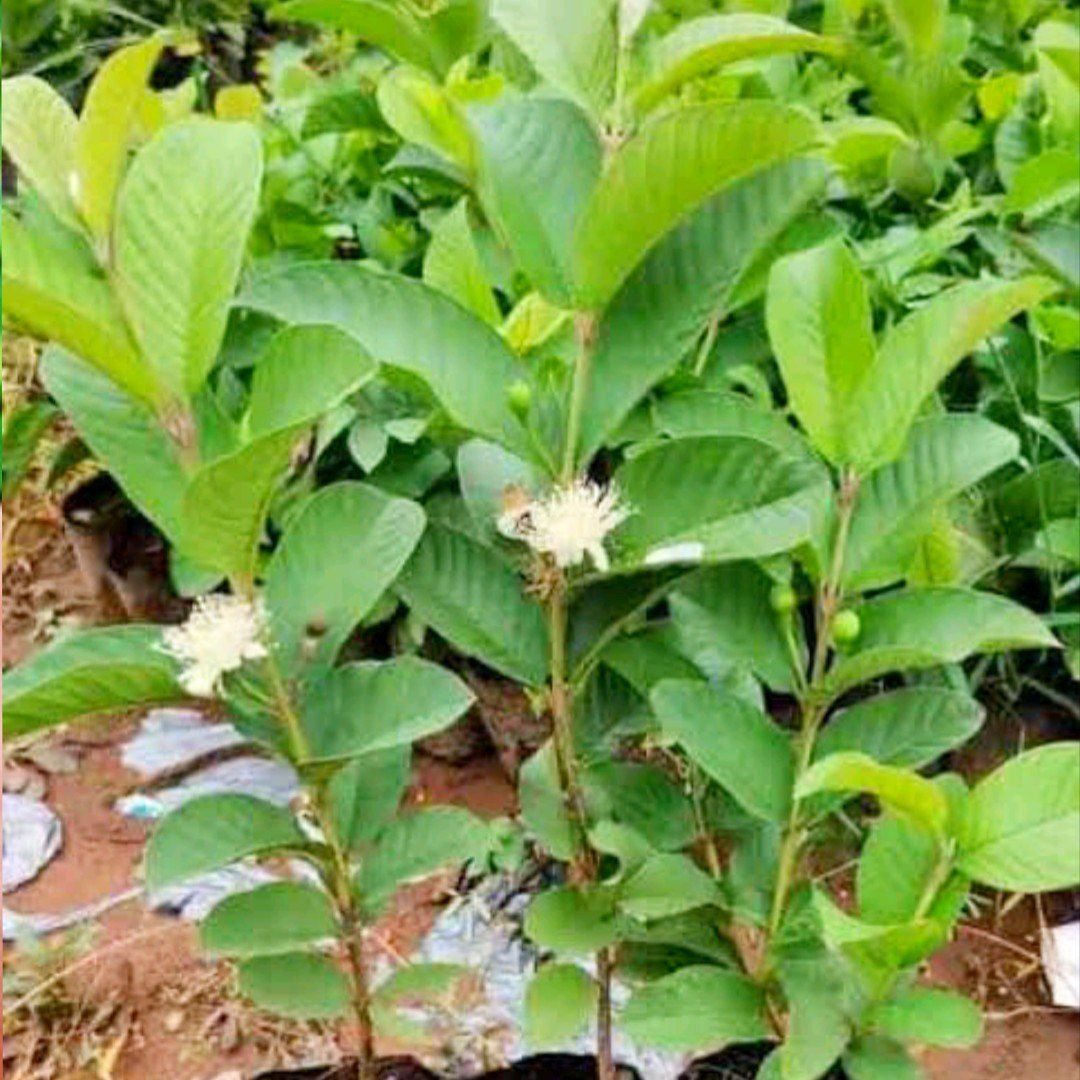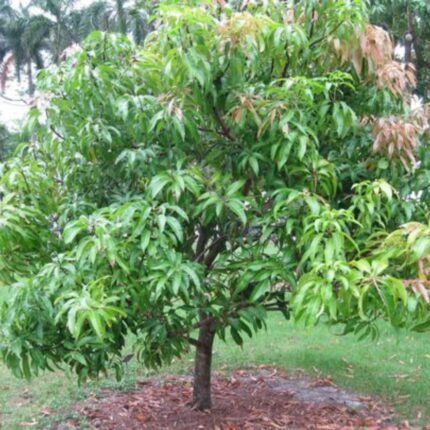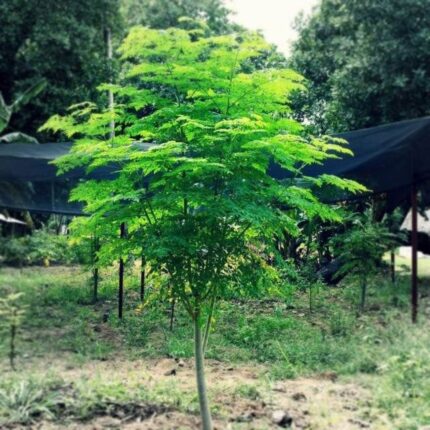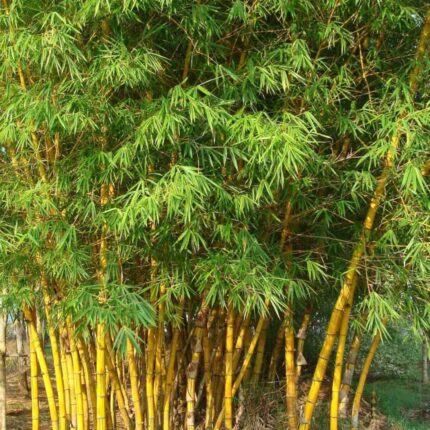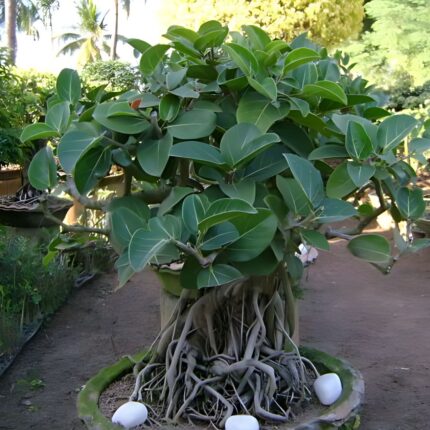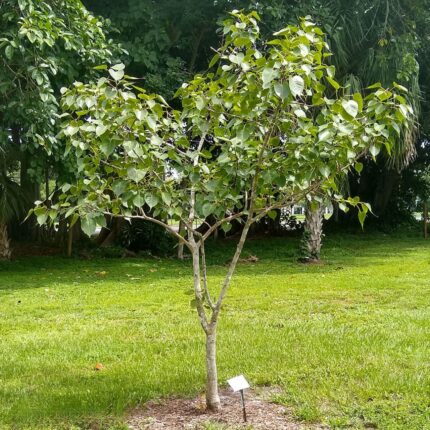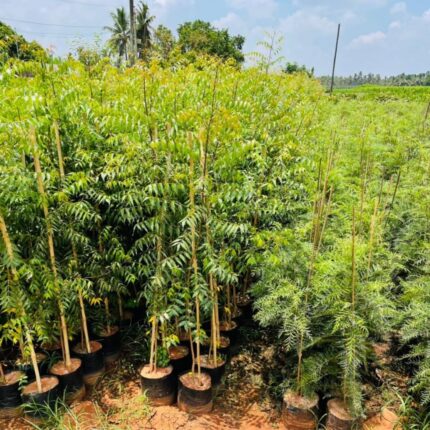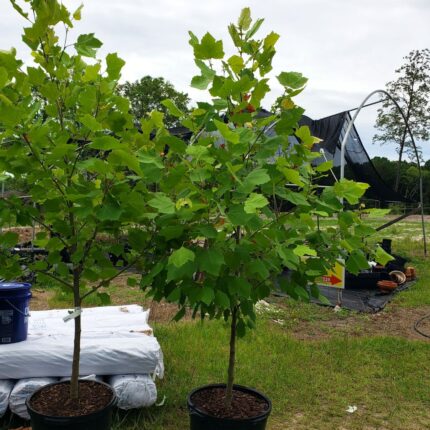Guava (अमरूद)
₹2,998.00
Guava is a small evergreen tree that typically grows to a height of 10-30 feet. It has a short trunk with smooth, copper-colored bark that peels off in thin flakes. The tree has broad, elliptical leaves with prominent veins and white, fragrant flowers that bloom individually or in clusters.
Description
Common Names:
- Guava tree
Botanical Information:
- Scientific Name: Psidium guajava
- Family: Myrtaceae
- Origin: Native to tropical regions in Central and South America
Benefits:
- Nutrient-Rich Fruit: Guava fruits are rich in vitamins A and C, dietary fiber, and antioxidants, which contribute to overall health and wellness.
- Improves Soil Fertility: Guava trees can enhance soil fertility by adding organic matter through fallen leaves and fruit, and by fixing nitrogen in the soil.
- Low Maintenance: Once established, guava trees are drought-tolerant and require minimal care, making them suitable for a variety of climates.
Uses:
- Culinary Uses: Guava fruits are consumed fresh, and can be processed into juices, smoothies, jams, jellies, candies, and pastries. The fruit’s high pectin content makes it ideal for making preserves.
- Medicinal Uses: Guava leaves and bark are used in traditional medicine to treat a range of ailments, including digestive issues, infections, and skin conditions. The leaves can be brewed into a tea to help with diarrhea and stomach pain.
- Nutritional Supplements: The fruit and leaves are often used in supplements due to their high content of vitamins and antioxidants.
Cultivation:
- Climate: Guava trees thrive in tropical and subtropical climates, with temperatures ranging from 15°C to 30°C (59°F to 86°F). They can tolerate short periods of frost but prefer warm, frost-free conditions.
- Soil: They grow best in well-drained soils with a pH of 4.5 to 7.0. Guava trees are adaptable to various soil types, including sandy, loamy, and clay soils.
- Watering: Young guava trees need regular watering to establish their root systems. Mature trees are drought-tolerant but benefit from deep watering during dry spells to promote fruit production.
- Sunlight: Guava trees require full sunlight for optimal growth and fruiting. They should be planted in a location that receives at least 6-8 hours of direct sunlight daily.
- Propagation: Guava trees can be propagated from seeds, but vegetative propagation methods such as cuttings, grafting, and air layering are preferred to maintain the quality of fruit.
Care and Maintenance:
- Pruning: Regular pruning helps maintain the tree’s shape, promotes air circulation, and increases fruit production. Remove dead or diseased branches and thin out crowded areas to allow light penetration.
- Fertilization: Apply a balanced fertilizer during the growing season to support healthy growth and fruit development. Organic compost or manure can also be used to enrich the soil.
- Pest and Disease Control: Guava trees are generally hardy, but they can be affected by pests such as fruit flies, aphids, and scale insects, as well as diseases like anthracnose and root rot. Regular monitoring and appropriate treatments (such as neem oil or insecticidal soap) help manage these issues.
Environmental Impact:
- Erosion Control: The extensive root system of guava trees helps prevent soil erosion, especially in areas prone to heavy rainfall.
- Biodiversity: Guava trees provide habitat and food for various wildlife, including birds, insects, and small mammals, supporting local biodiversity.
By planting guava trees, you not only enjoy the delicious and nutritious fruits but also contribute to environmental sustainability and soil health.
Related products
Bamboo (बांस)
₹2,998.00
Banyan (बरगद)
₹2,998.00
The Banyan tree, scientifically known as Ficus benghalensis, is a large, evergreen tree renowned for its extensive canopy and aerial roots. Native to the Indian subcontinent, it is considered a symbol of immortality and longevity in many cultures. The tree is known for its wide spread, often covering several acres with its expansive branches and roots that descend from its branches to the ground, forming additional trunks.
Ficus Religiosa (पीपल)
₹2,998.00
Mango (आम)
₹2,998.00
Mango trees are evergreen and can grow up to 30-40 meters tall, with a canopy that can span several meters wide. The leaves are long and glossy, and the tree produces fragrant, small white or pink flowers. The fruit varies in size, shape, and color, but is typically oval or round, with a skin that can range from green to yellow to red when ripe. The flesh inside is juicy and sweet, surrounding a large, flat seed.
Moringa (सहजन)
₹2,998.00
Moringa, often referred to as the "miracle tree," is a highly versatile and resilient plant native to the Indian subcontinent. It is renowned for its exceptional nutritional value, medicinal properties, and environmental benefits. Moringa is widely cultivated in tropical and subtropical regions around the world.
Neem (नीम)
₹2,998.00
Neem is a fast-growing, evergreen tree native to the Indian subcontinent. It can reach a height of 15-20 meters (49-66 feet), and in rare cases, up to 35-40 meters (115-131 feet). It is known for its robust structure, bright green foliage, and fragrant white flowers. The tree produces small, olive-like fruit that turns yellow when ripe.
Sycamore (गूलर)
₹2,998.00
The sycamore tree (Platanus occidentalis) is a large, deciduous tree native to North America. Known for its distinctive mottled bark and broad canopy, the sycamore is a majestic presence in many landscapes. The tree can reach heights of 70 to 100 feet or more, with a trunk diameter often exceeding 3 to 8 feet. Its leaves are broad, with three to five lobes, resembling those of a maple tree, and can grow up to 10 inches wide.

